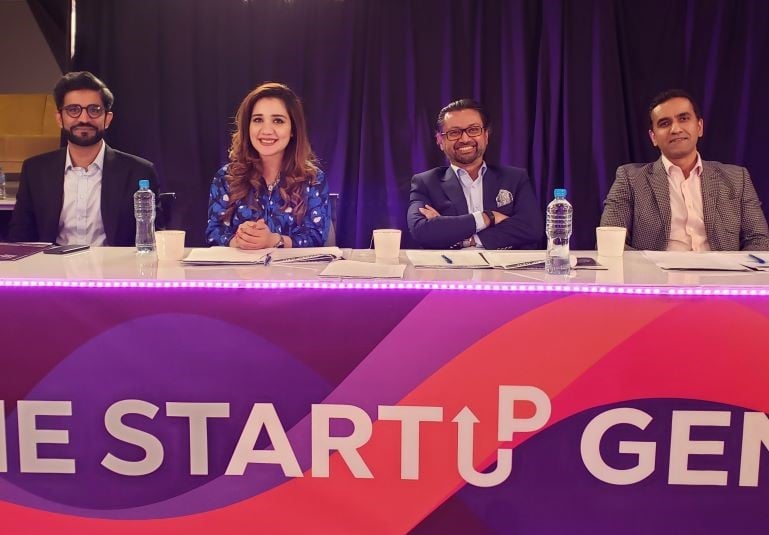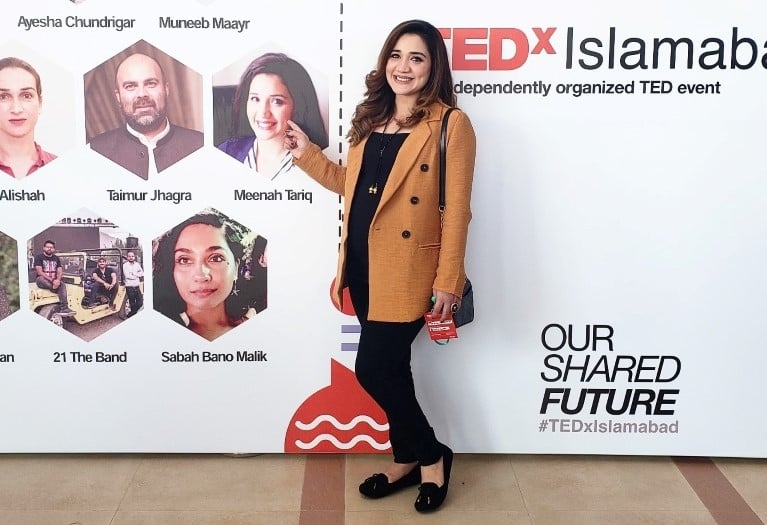Meenah Tariq is a powerhouse. For the past two years she’s had a front row seat witnessing the growth of Pakistan’s entrepreneurship ecosystem as a partner in the Venture Capital fund, Karavan.
When Tariq was Head of Strategy at the Pakistani accelerator Invest2Innovate (i2i) in 2017, she took part in an Australia Awards course run by University of Queensland International Development.
She learnt how to manage Business Incubator Centres in Pakistan, with an embedded focus on promoting women’s leadership and participation in business and entrepreneurship.
But Tariq’s business acumen started much earlier. At seven, Tariq sold her mother’s lemons back to her as lemonade then bead bracelets to her mother’s friends. At 10, she was a child star in a popular TV serial “Bandhan”.
At 14, she launched HennArt (Henna art on women’s hands for weddings), which ran for 10 years.
She also hired out her cousins as a labour force in the neighbourhood and from childhood into early adulthood developed many other entrepreneurial iterations: western style dress designer, singer-song writer, wedding event management and photography.
At seven, Tariq felt invincible, but at 24 she struggled with self-doubt.
Tariq didn’t know if her ideas were worth anything anymore. She had a string of business ‘failures’ behind her, and no one around her had startup ideas; friends were planning weddings, but she didn’t want to.
Then she was kicked out of home by a loving mother who wanted her daughter to find a life purpose and to travel. Tariq received a Fulbright scholarship to study an MBA at Babson College in Massachusetts, USA. While at university she started several startups, but what she really learnt was her true calling – helping others to launch their own ideas!
Tariq answers questions for UQ’s Josepha Dietrich about her life in Pakistan as a leading entrepreneur and about her time on the Australia Awards short course.
How did the Business Incubator Management (BIM) course accelerate your life in entrepreneurship?
Before the BIM course, I was running the i2i accelerator constantly in a fire-fighting mode.
There was so much to do, and we were trying to create the best possible programs with a definite scarcity mindset. The BIM program brought this to my attention.
When we were told to take a step “out” and work “on” our program instead of only “in” our program. We were taught how critical branding is even for incubators.
The first phase of the World Bank Women Entrepreneurs Finance Initiative (We-Fi) program that I designed was heavily inspired by the BIM course. I realised how critical it was that incubator managers get the right training in investment readiness and fundraising, if we want startups to get the right information.
The first phase of the Pakistan We-Fi was a training program for incubator and accelerator managers from across Pakistan. 28 incubators (49 individuals, with approximately 50% women) were trained during this program; hailing from nine cities. This was the first of its kind; standardised large scale training that was locally available for incubator managers in Pakistan!
I learned about “Virtual CFOs [Chief Financial Order]” in Australia. This was not something I had ever heard of. When I came back home, I convinced my husband, Omar, who is a chartered accountant, to start working with our startups at Invest2Innovate as a Virtual CFO, providing them with the support they needed.
This program was highly appreciated by our startups. This is what also got Omar involved in the startup ecosystem, and my learnings at UQ accelerated both of our understanding of the Venture Capital (VC) value chain, leading to becoming VCs in Pakistan.
But even more exciting, my husband the “VCFO” was just the first iteration. I am now creating a tech product called VCFO to help startups manage their business finances.
Financial management is still a massive issue for startups and young businesses, and VCFO aims to be the most founder friendly financial app for business owners, to help them on their growth and fundraising journey.
How did you get involved with We-Fi in Pakistan Initiative?
One year after finishing the BIM course, I left i2i and took some time to analyse where I could be useful. I realised that the knowledge I had gathered from my work with entrepreneurs during 3.5 years of running an accelerator would be useful for two stakeholders: development sector players who need to design better programs for entrepreneurs, and VC investors who need to understand the ecosystem to get to better deal flow [aka the pipeline of investible businesses that an investor can consider putting money into].
With this in mind I joined the World Bank as a consultant, to help them design the brand new “Women Entrepreneurs Finance Initiative” for Pakistan.
The program focuses on the challenge of access to finance for women entrepreneurs, and aims to help solve the problem through different interventions.
The first was data gathering and conducting analysis, commissioning the Pakistan Startup Ecosystem Report to help shed more light on the issues. We were also able to get Pakistan admitted to the Global Entrepreneurship Monitor. The second was working with intermediaries (incubators and accelerators) to help upskill them.
The third phase was working with entrepreneurs – 300 women entrepreneurs were trained in investment readiness, and 30 additional women-led businesses will receive direct coaching to help them raise funding.
Finally, with the gaps in the funding value chain in mind, we will be working with high net-worth individuals to help them become angel investors, and coach them in creating angel syndicates, unlocking more capital for the ecosystem.
What first got you interested in innovation and entrepreneurship?
For me, entrepreneurship was linked to personal power, which I saw would come to women through financial independence and financial independence alone. The ability to take decisions, make your own choices, live life on your own terms – all of these were awarded more easily to those women around me who had some form of economic independence.
I learned this lesson very early on. And because back then it was still rare to see women holding ‘jobs’ (unless doctors or teachers), entrepreneurship was the avenue I latched onto.
My hypothesis was also proven right, because I was able to spend the money I made on my own terms, which motivated me even more.

Meenah at The StartUp Gen
For me, entrepreneurship is about upward mobility and personal accountability; both values that are very close to my heart. Making your own life better, while at the same time creating value for the sector and society you’re in. Taking charge instead of waiting for ‘others’ to provide what you need.
I saw very early on that even my one-person henna business meant the circulation of money in the economy, all the way down to the farmer growing henna leaves.
I believe entrepreneurship is an economic force that has the power to change individual lives, societies and countries, and this is my ‘why’ for doing all the work I have done in the last decade, in service to the cause of entrepreneurship.
How has COVID-19 impacted Karavan and your life in Pakistan?
During 2020, at the height of COVID-19, Karavan did five new startup investments for some fantastic founders. All these investments were made remotely, and two of these startups have already raised their Series A now.
One of our portfolio companies became the first Pakistan cheque for US Venture Capital firm Kliner Perkins, which is awesome for Pakistan.
When the pandemic hit, I was worried for what it would mean for entrepreneurship in Pakistan, with the ecosystem still being so new. But the Pakistani entrepreneur is tough, he/she is used to persevering in the face of extremely challenging environments.
Our ecosystem not just persevered, but with the masses of new opportunities opening up with 100 Million new people coming online during the pandemic, new entrepreneurs came into the battle field too. It was phenomenal.
In 2021, so far Pakistani startups have raised US$85 million, mainly from international funds, crossing all previous years. Pakistan is becoming a super exciting space for investors, who see the 220 million population, with 60% under the age of 30, the fast internet and tech adoption, and our tough entrepreneurs working to make everything possible.
What recent achievements are you most proud of?
Since 2018, I personally trained 600+ women entrepreneurs through in-person two-day business growth training in tier 2 and 3 cities across Pakistan. I did this over the course of a very hot Summer in 2019, while pregnant.
These trainings changed the way I think about entrepreneurship in emerging ecosystems, helping me understand the intersectional nature of this economic force.
During 2020, I was hired by ILO and UNDP to help advise the government of Pakistan on how to support small businesses and encourage entrepreneurship in the country, especially during the pandemic.
As one of five women in VC in Pakistan, I created a course called “Women in VC” to train others in how to enter the VC space. This was to try and get more women hired by VC funds, especially in decision making positions. This is also with the belief that more women on the VC side will hopefully result with more women entrepreneurs getting funded, or at least create a more healthy environment for women entrepreneurs who are looking to fundraise.

Meenah hosting ‘Rising Pakistan’
Hosting a segment on the morning show ‘Rising Pakistan’, discussing entrepreneurship and business growth in the Urdu language, for the masses, on Pakistan national television! I answer questions and queries, and help people in the most far flung areas of the country make better decisions for their businesses.
The cause of entrepreneurship is greater than people, it is greater than nations and countries. Entrepreneurship and entrepreneurial thought is something we are born with, and if nurtured, it will help us carve fantastic roads and avenues of growth, beyond our own wildest imagination.
An entrepreneur in Australia has the same basic DNA as one in Pakistan, or any other region in the world. A startup has the same foundation, the same needs.
If anyone reading would like to get connected to the Pakistani startup ecosystem, as advisors, investors, or entrepreneurs, I’d love to help!




















Trending
Daily startup news and insights, delivered to your inbox.